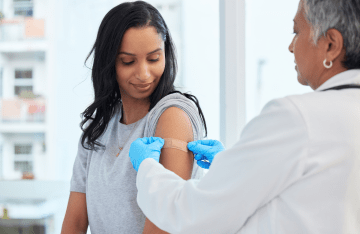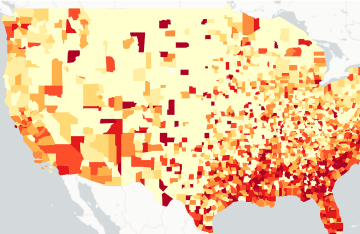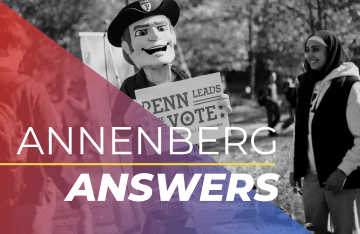How Misinformed Vaccine Beliefs Affect Policy Views
Vaccine misperceptions are the strongest driver of opposition to pro-vaccination public policies.

Photo Credit: Diana Polekhina / Unsplash
While there is broad support in the United States for pro-vaccination policies, as many as 20% of Americans hold negative views about vaccines. Such misinformed vaccine beliefs are by far the strongest driver of opposition to pro-vaccination public policies — more than political partisanship, education, religiosity or other sociodemographic factors, according to new research from the Annenberg Public Policy Center (APPC) of the University of Pennsylvania.
The findings, published online today in the American Journal of Public Health, show how misperceptions about vaccination have the potential to shape public policy. The study is based on an APPC multi-wave panel survey of 1,938 U.S. adult respondents conducted in 2019, during the United States’ largest measles outbreak in a quarter-century.
The researchers found that belief in a group of negative misperceptions about vaccination:
- reduced the probability of strongly supporting mandatory childhood vaccines by 70%,
- reduced the probability of strongly opposing religious exemptions by 66%, and
- reduced the probability of strongly opposing personal belief exemptions by 79%.
“There are real implications here for a vaccine for COVID-19,” said lead author and former APPC postdoctoral fellow Dominik Stecula, an assistant professor of political science at Colorado State University. “The negative vaccine beliefs we examined aren’t limited only to the measles, mumps and rubella (MMR) vaccine, but are general attitudes about vaccination. There needs to be an education campaign by public health professionals and journalists, among others, to preemptively correct misinformation and prepare the public for acceptance of a COVID-19 vaccine.”
Stecula was on a team of APPC researchers that included former APPC postdoctoral fellow Ozan Kuru; Dolores Albarracín of the University of Illinois at Urbana-Champaign, who is an APPC distinguished research fellow; and APPC Director Kathleen Hall Jamieson.
Broad support for vaccines
Overall, the researchers found strong support for pro-vaccination policies in the United States:
- 72% of U.S. adults strongly or somewhat supported mandatory childhood vaccination,
- 60% strongly or somewhat opposed religious exemptions for vaccines, and
- 66% strongly or somewhat opposed personal belief exemptions in their states.
“On the one hand, these are big majorities: Well above 50% of Americans support mandatory childhood vaccinations and oppose religious and personal belief exemptions to vaccination,” said Kuru, an assistant professor of communications and new media at the National University of Singapore. “Still, we need a stronger consensus in the public to bolster pro-vaccine attitudes and legislation and thus achieve community immunity.”
With the current COVID-19 pandemic, the portion of the population that needs to be exposed to the disease or inoculated to achieve community immunity is not yet known.
Research on vaccine beliefs
The researchers drew from a probability-based, nationally representative sample of U.S. adults, specifically from two waves conducted in February-March and September-October 2019. They measured negative beliefs in vaccination by asking respondents about four common claims by those who view vaccination skeptically, including the beliefs that: vaccines cause autism; vaccines are full of toxins; delaying vaccination and altering the vaccine schedule is not harmful; and developing natural immunity by catching the disease is superior to getting vaccinated.
The analysis controlled for a variety of theoretically relevant variables that could shape views about vaccination, including gender, education, income, and age, as well as self-described religiosity, partisanship, the presence of children in the household, and recent exposure to news about the MMR in the news and social media.
An earlier study from the Annenberg Public Policy Center, also using survey data collected during the 2018-19 measles outbreak, found that people who rely on social media were more likely to be misinformed about vaccines. Another APPC study found that people who used conservative or social media at the outset of the COVID-19 pandemic were more likely to be misinformed about how to prevent the virus and believe conspiracy theories about it.
“Policy Views and Negative Beliefs About Vaccines in the United States, 2019” was published online ahead of print in the American Journal of Public Health (AJPH) on August 20, 2020: https://www.doi.org/10.2105/AJPH.2020.305828
Media Contact
Michael Rozansky
michael.rozansky@appc.upenn.edu
215-746-0202



